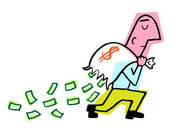 Much is being written about a potential bursting of the bond bubble. I have commented on several occasions as to how we will handle that event via our sell stop discipline, whenever it occurs.
Much is being written about a potential bursting of the bond bubble. I have commented on several occasions as to how we will handle that event via our sell stop discipline, whenever it occurs.
Keep in mind that, just like the equity collapses in 2000 and 2008, bubbles don’t burst overnight. There will be a slow deterioration in prices first before eventually the bottom could drop out giving those who follow trends plenty of time to move to the sidelines.
On that topic, here are some highlights from “Worried About Fixed Income Bubbles? Try A Dividend ETF:”
The U.S. has seen its fair share of bubbles in the past; the Tech bubble of a decade ago defied logic had but nevertheless attracted billions of dollars; with stocks selling at over 100 times their earnings in 1999 it should have been no surprise when most of these overvalued securities saw an 80% decline shortly thereafter.
Some respected investors think the bubble now forming will be equally devastating. “The bond market is the mother of all bubbles right now and I think when it bursts the losses will dwarf the combined losses of the stock market bubble and the real estate bubble,” said Peter Schiff. “This decade will be the worst decade for bonds in U.S. history.”
While this is just one man’s opinion, I agree that, when looking over the next decade, the dangers of a bond bubble bursting a very real, since it’s a given that interest rates will not be staying at these levels forever.
However, given the current economic backdrop, more upside potential is a distinct possibility. That means until the trend reverses, and a sell stop is being triggered, I see no reason to exit my positions at this time. The problem is that many investors do not have an exit strategy, neither for equities nor for bonds, and they will be the ones getting caught when the downside comes into play.
The article goes on to discuss other options such as investments in Dividend ETFs. Three of them are featured, namely CVY, IXC and IYR.
Unfortunately, nowhere is it mentioned that dividend ETFs carry the same risk as being outright invested in equity ETFs. To me, it has never made much sense to own an income producing instrument that pays a decent dividend, while the principal deteriorates because of declining market conditions.
Stock market direction is anything but certain, so if you select dividend ETFs as your preferred income generator in these times, you need to be clear about your exit point.
I believe that currently the downside risk in the stock market is far greater than the bond bubble bursting because of a weakening economy. Recent numbers support my view, but I am also flexible enough to change directions should my opinion prove to be incorrect. I suggest you do the same.
Disclosure: No positions
Contact Ulli